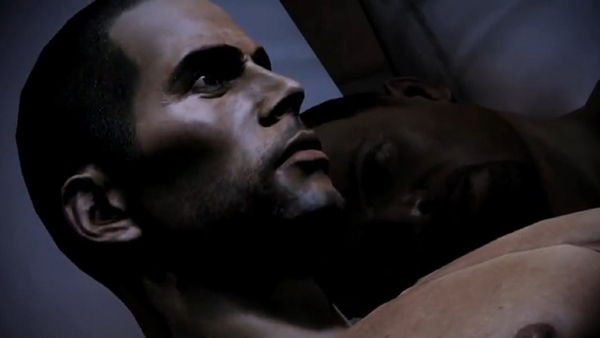Video gaming is no stranger to sexual controversy. Case in point: after the original Mass Effect was released, Fox News made sensational claims of rampant full nudity and graphic sexual images. Part of the hullabaloo focused on the genders of the lovers in question. If you chose to play lead character Commander Shepard as a female, you could romance a crew member of the all-female Asari race, meaning that a lesbian relationship (if the word "lesbian" could even be applied in this circumstance) was possible.
At the time, gamers rose to developer Bioware's defense. The studio had long been beloved, having created such role-playing classics as Baldur's Gate and Neverwinter Nights. We raised our voices in solidarity, supporting our cause. Gaming, and gamers, were being attacked. The mainstream press was the enemy, and we defended Bioware's creative drive with sharp tongues and heady righteousness.
My, how things have changed.
Mass Effect 3 was released last week, and the non-gaming press has largely ignored the game's (relatively tame) sexual content. The gaming community, on the other hand, has turned on its former darling, using strong rhetoric to attack the trilogy's finale. Some fans have legitimate gripes. Some of them are unhappy with the ending, though to avoid spoilers, I'll avoid mentioning what has them aggravated. Some of them bristle at the new multiplayer mode and how it influences the expansive single-player story. And unfortunately, some players condemn Mass Effect 3 for supporting man-on-man romance.
Why the change of heart? After all, Mass Effect 3 leaves such matters up to the player. This isn't real life. I didn't choose to be gay, but as a male Commander Shepard, I can romance multiple characters, the majority of them female. Bioware has hardly burdened the unwitting masses with explicit gay subject matter -- they've simply allowed me to see my in-game character as I see myself. In fact, other Bioware games, such as the acclaimed Dragon Age: Origins, have allowed me to do the same, as have games from other studios, like Fable II, and the perennial favorite, The Sims.
Nevertheless, review aggregation website Metacritic was inundated with homophobic venom following Mass Effect 3's release. The site is removing inappropriate user content, but as I write this, there's still plenty of bile being spewed. As one of the tamer reader reviews states: "Bioware figured let's make the hero homosexual now in stark contrast to the first 2 games where he was normal." Meanwhile, after my review of the game was published on GameSpot, one of the first replies I received on my Twitter feed claimed that I must love "faggot niggers." (Cortez, a male love interest, is a man of color.)

Commander Shepard and Cortez wake up together in Mass Effect 3.
Some of the unease comes from growing discontent with Bioware as a whole. With Dragon Age II, the studio left its PC-centric design in favor of a simpler game with greater crowd appeal. Fans revolted, criticizing everything from the story to the gameplay, and blaming publisher (and Bioware owner) Electronic Arts for restraining the studio's creative drive. A blatant marketing campaign that impacted gameplay certainly didn't garner Bioware any goodwill. Game journalist Jessica Chobot's overtly sexualized likeness appears in the game as a potential love interest, but her mediocre voice acting and awkward, unnecessary presence makes it easy to conclude that Bioware is willing to sacrifice creativity in favor of promotional partnerships.
This wouldn't seem to have much to do with gamer homophobia at first glance. Ask anyone who plays Halo or Gears of War online and you hear the same stories: everyone is called a faggot, and games are routinely called "gay" in the pejorative sense. This is the young male audience, hiding behind the usual curtain of online anonymity. It's not news to anyone remotely interested in video games. But Bioware has traditionally avoided homophobic ire, and the context is important. The studio now caters to the masses, and as one Metacritic user suggests, they went "the way of political correctness and interject(ed) as much Homo mumbo jumbo into it as possible." Compared with our singular defense of the original Mass Effect, you'd think Bioware was thanking us for our support by murdering our families and leaving their lifeless husks out for the vultures to peck. We gamers are an entitled bunch.
And -- no surprise -- the young men who form the most vocal subset of the gaming community aren't the most welcoming bunch. To them, lesbian romance was fine, because lesbian romance was hot. Besides, the Asari aren't really lesbians; they're aliens! By contrast, they regard gay male romance as gross and shoved down our throats by nature of its existence. No matter that you can simply choose not to pursue that road if you don't wish to. To this gamer, the answer is simple: Bioware must cater to him, and to him alone. It's bad enough that the real world has to include homosexuals, but his games, too? Preposterous. Disgusting. Liberal. It's the gay agenda at work, soiling the heteronormative power fantasy he's been able to have up to this point.
Remember the guy who called me a lover of "faggot niggers"? We're not changing his mind anytime soon. But the reasonable majority can fill the deafening silence with words of support. If you love games, champion developers like Bioware for filling their games with people we recognize; it's comforting to see people like me, and not like me, in these worlds. And if you're a member of the gaming press, use your words to say something meaningful. It's not always enough to say, "Well, here's a thing." You have a voice. It's time to say, "This isn't OK." We're in a position to take a stand. So take one, already.